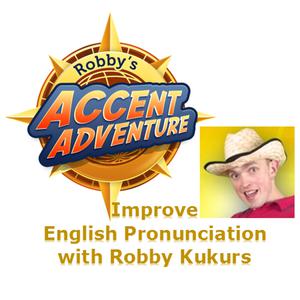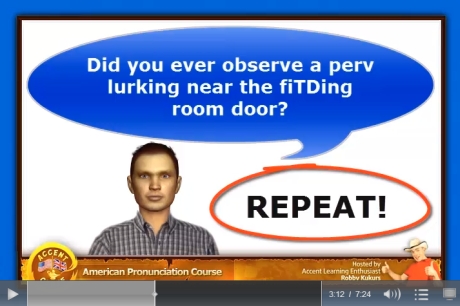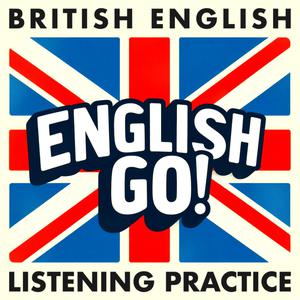
Accent Adventure Podcast: Improve English Pronunciation | Learn American English | Learn British English
Accent Adventure Podcast: Improve English Pronunciation | Learn American English | Learn British English
Accent Adventure podcast is hosted by Robby Kukurs – a non-native English speaker who teaches the American and British English pronunciation and slang.
- 10 minutes 49 secondsHow Native English Speakers ACTUALLY Pronounce the TH Sound!
Here’s how to practice your American Pronunciation – imagine that you take some water in your mouth, then start watching my video and repeat every sentence after me! Here’s the sounds you have to FOCUS on: R sound, flap T sound, W sound, ‘Ash’ sound, dark L sound – the more you practice, the better you’ll get at it!
Video Transcript Below:
Hi guys, it’s Robby here from AccentAdventure.com where we learn to sound like American English speakers, right?
But in case you don’t really aspire to sound like an American English speaker, if your goal is just to improve your pronunciation enough to sound decent while communicating with other people in English, you still may want to check out the blog, AccentAdventure.com right here!
Just click on this link and it’s going to take you to my blog where you’ll find dozens upon dozens of very relevant articles and videos and it’s all about pronunciation improvement.
It’s not necessarily how to sound like a British English speaker or an American English speaker but it’s going to improve your accent big time, even if you don’t aspire to sound like a person coming from a specific geographic area.
But anyway, the whole thing it’s geared more towards the American pronunciation and that’s what I’m probably more passionate about myself personally and that’s the road I’m taking anyway.
And in today’s video we’re going to look at much the dreaded English sound, TH, right?
TH sound which is the “the”, the voiced version of it, right? TH like in the word “the,” right? “The” and the unvoiced version TH like in the word “thumb”, all right?
Biggest Mistake Made by Foreigners – OVERDOING the TH Sound!
And this is what a lot of foreigners get wrong when they’re trying to use this sound or to pronounce this sound when they speak, right?
They try to get it like in a book, right? They tell you that you have to pronounce it this way – you have to place your tongue between your teeth like that. This and these, that and those, this is how the TH goes, right? There’s a saying like that. And you guys are probably trying to get it just like in the book when you speak and that’s when you start running into an awful lot of problems.
And the reason being, in real life I’ve yet to meet a native English speaker who pronounces these words like that: this and these. Nobody does that. Nobody ❗
Because in reality the TH voiced sound TH becomes more like D. It’s something like the D sound, right? It’s just that it’s not really a stressed D. Nobody really says “Dis”, right? Although there are certain native English speakers who say that, who speak that way when they come from specific geographical areas. But anyway, that’s beyond our discussion today.
Don’t Place Your Tongue BETWEEN the Teeth – It’s WRONG!
Suffice it to say that, you just have to place the tip of your tongue behind your teeth. TH. TH. Like that. TH. This. This. This. It’s this. It’s this. Nobody really says “it’s this.” People say “it’s this”. It’s the 100th video on my YouTube channel. It’s the 100th video. Nobody really says “it’s the 100th video.” It’s the 100th.
And speaking of the unvoiced version, the TH, the TH sound as in the word thumb, it becomes T. It’s more like T. 100th. For the 100th time. It’s my thumb. Thumb, right?
Obviously it’s not the very same as T. It’s not my tumb. It’s thumb. It’s something between the thumb and tumb, right? Thumb. Thumb. Thumb. Thumb. But it’s more closer to the T sound, right?
So you’ve got to be imagining that you’re actually pronouncing the word tumb instead of thumb to get it right. And why I said that a lot of foreigners run into problems when they’re trying to nail this sound and make it sound textbook like? The reason being, they get it completely wrong. They go overboard, okay?
And in relation to this I want you to check out this particular article called “Don’t overdo your English pronunciation” – click right here. It’s going to take you to my blog where you’re going to read the article, right? And it’s all about trying to get the pronunciation a 100% correctly and that that’s when you’re starting developing these issues.
A Lot of Eastern Europeans Get the TH Sound Completely Wrong – Because They’re Overdoing It!
And the here’s the typical example. A lot of Eastern Europeans such as Latvians which is what I represent, I’m a Latvian myself and Russians most notably probably pronounce the voiced TH sound as Z. Zis is.
Instead of saying simply this is, right? It’d be way easier for those folks just to say “dis is”, right? They would just have to imagine that the word this is spelled the following way D-I-S, right? Dis is. But they’re obviously being taught wrong by their teachers at school, right?
So teachers probably demanded that they get the sound a 100% correctly, just like it says in the textbook by their tongues placed between their teeth. This is. This. And obviously a lot of those people don’t get it. They just can’t for some reason or another and then eventually they end up with saying “zis is”. Zis is.
Because when you’re placing your tongue – I was going to say your thumb – your tongue between your teeth and then when you pull it back ever so slightly it becomes Z. Z. Z. So a lot of those Russians or Latvians or Ukrainians, you name it, you pick any Eastern European country you want, a lot of them say “zis”. Instead of just saying “dis” which is way easier, right?
So that’s what I warmly suggest you do guys if you’re one of those people who can’t get it right, who can’t say “this” between your tongue placed between your teeth, you’ve got to imagine that you’re actually saying the letter D or T in case it’s the unvoiced TH sound, right?
And just like I said actually no real native English speaker speaks like that in real life. Nobody says “this is”. Especially in fast speech people say “dis is”. “Dis”. So the TH actually does become more like “dis” and not so much as “this”. All right?
How to Pronounce the TH Sound in “Close The Door”
And going back to the question which is the reason why I’m actually creating this video in the first place, one of my subscribers asks me a question if I can make a video on how pronounce the TH sound after “S” like “close the door”. Close the door.
Well, it’s pretty much the same. You’ve got to imagine that TH is actually D. So instead of saying “close THe door” which is very confusing if you’re trying to get it fast, you really can’t. It’s very difficult to say “close THe door” Close THe door, right? So forget about placing your tongue between your teeth, just say “Close de door”. Close de door. And it’s going to be just fine. That’s how native English speakers speak all over the world.
How to Pronounce the TH Sound in “Clothes”
And the other question he asks is how to pronounce S after the TH sound, like “clothes”, right? C-L-O-T-H-E-S. Nobody really says “clothes”. It’s totally wrong. And actually that’s what the dictionary tells you to – that’s how the dictionary tells you to pronounce this word. The phonetic transcription actually has included the symbol for the voiced TH sound. So you’d be thinking that you’ve got to be pronouncing the “THe” thus making the pronunciation as “cloTHes”, right? But that’s wrong. People just say “close”. It’s as if you’re saying “close the door”, right?
So again, just forget about the TH and imagine you’re just saying “close”. Put the clothes on and close the door, right? It’s pretty much the same pronunciation my friends.
In this relation I want you to read the following article “The importance of speaking out loud when learning new English vocabulary words”. Click on it. Read it. And it’s the other blog that I have EnglishHarmony.com. And well, in this case I can’t actually link to this article straight from this video because I’m only allowed by YouTube to link to my Accent Adventure blog.
So you’re going have to enter this URL in the URL bar above in your Internet browser. But anyway, it’s worth reading. And it’s all about the importance of learning new vocabulary by speaking it out loud. And obviously you can’t just rely on the dictionary, phonetic descriptions and whatnot because they’re oftentimes wrong. You’ve got to actually listen how words are pronounced in real life by real people, right?
And there’s no better way of getting that right than checking out the Accent Genie program which is a product I created myself!
There’s hundreds upon hundreds of American English phrases and sentences which you will be repeating thus imprinting all those sound patterns into your brain and into your mouth, most importantly, which is going to enable you to speak like an American English speaker.
And just like I said in the beginning of this video it’s not just about speaking like an American speaker, you’ve got to be just speaking very well. Your pronunciation is going to improve big time.
All right my friends. I hope that this shed some light on how to pronounce the TH sound. And if you have any questions please publish them in the comment section below.
Thanks for watching and bye-bye!
Robby
 15 February 2016, 5:48 am
15 February 2016, 5:48 am - 6 minutes 46 secondsHow to Pronounce Contractions I’ll, You’ll, He’ll, She’ll, It’ll, We’ll, They’ll in American English
Video Transcript Below:
Hello guys, hello boys and girls and welcome back to Robby’s Accent Adventure video blog, where we learn to speak like American English speakers.
Yes! I’m trying to sound like American currently and I’m putting on my general American pronunciation and in case you’re wondering how that’s possible, how we can achieve the same kind of results, you definitely may want to check out the Accent Genie program.
I was following the same principles outlined in the program and you’ll be repeating hundreds upon hundreds of sentences spoken out loud by a native English speaker and you’ll be repeating them and you’ll be focusing on the key sounds.
What I’ve done with those videos is I’ve gotten rid of all the irrelevant stuff. And you’ll be only focusing on the sounds that will actually enable you of sound like an American English speaker, right?
There are so many other courses out there but what they do is they analyze the whole speech and you’re focusing on too many details at the same time. So it’s way too overwhelming.
Anyway, let’s get down to today’s business which is contractions: I’ll, you’ll, he’ll, she’ll, it’ll, we’ll, they’ll.
Why I’m Talking About It? One Of My YouTube Commentators Asked Me To!
And the reason why I’m going to be talking about them is I was asked by one of my YouTube commentators to make a video about them and specifically how to pronounce them in fast and slow speech.
And he asks me that because there’s only one – according to him – there’s only one video on YouTube and that person isn’t even from an English country and doesn’t sound like a native English speaker. And I really appreciate your comment because by reading that you would think that you think I sound like a native English speaker which is a great thing.
Thanks for saying that and anyway, I’m not a native English speaker. My native background is Latvian. I come from Latvia and I’ve been living in an English speaking country for 14 years now, right? Not 40, 14. But it’s not the United States, it’s Ireland.
But anyway, I’ve always taken such a great interest in everything that’s got to do with the United States that a few years ago I decided to teach myself how to sound like an American English speaker. And I’d like to think that I have approached that level where one would hear that I sound like a native American English speaker, right?
It’s the Dark ‘L’ That You’ve Gotta Be Focused On Here!
Anyway, sounds I’ll, you’ll, he’ll, she’ll, it’ll, we’ll, they’ll is a typical dark “l” sound. And actually it happens so that a few years ago I recorded a video about the two different “l” sounds. The light “l” and the dark “l”, right? So you may want to check out the video here, in that you’ll find out everything there is to know about the dark “l”.
But anyway, nonetheless I’m going to read out these following sentences that I wrote down there in order to show you how to pronounce these sounds in these specific contractions, right?
I’ll Do It
So I’ll do it. I’ll do it. Or slowly, I’ll do it. Well, to be honest with you, I don’t really see the big difference, I’ll do it or I’ll do it. One way or another the “l” sound is the dark “l”. L. I’ll do it. I’ll do it, you know. It’s not I’ll do it. It’s “l”. It’s a bit more throatier than the light “l” sound, right?
You’ll See for Yourself
You’ll see for yourself. You’ll see. You’ll see for yourself. You’ll see. You’ll. You’ll. You’ll. It’s a bit throaty. So you definitely refer back to that video made a few years ago. So that’s the way you pronounce these “l” sounds in these contractions. You’ll. You’ll see for yourself. So you’ll. Then you kind of swallow the sound. You’ll. Almost like that, right? You’ll see for yourself.
And as a matter of fact, this “l” sound is very characteristic to American English speakers, so you definitely may want to get it right. You definitely may want to nail it. You may get the other sounds so-so but once you get the “l” sound which gives you the throaty sound, that’ll definitely make you sound like an American English speaker.
He’ll Come Around, Don’t Worry!
He’ll come around, don’t worry! He’ll come around, don’t worry! He’ll come around. So again, it’s the typical dark “l” sound. He’ll. It’s almost like the llll. He’ll. Obviously I’m exaggerating but it’s just to make the point, right? He’ll. He’ll come around.
She’ll Be Back for More
She’ll be back for more. She’ll. She’ll be back for more. She’ll be back for more. She’ll be back for more. She’ll be back for more. She’ll. Again, the same old dark “l” sound.
One Way or Another It’ll Happen!
One way or another it’ll happen! One way or another it’ll happen! What’s curious about this particular contraction “it’ll” is that the “t” sound becomes the flat “t”. It’s something between “t” “d” and a little bit of “r” as well. It’ll. It’ll. It’ll happen. It’s not it’ll happen. It’ll. But it’s it’ll happen. It’ll. It’ll. Right? So you have to imagine that you’re pronouncing both sounds “t” and “d” at the same time. It’ll. And a little bit of ”r”. That’s what helps me to get the sound right. Okay? So it’ll happen.
We’ll Figure It Out!
We’ll figure it out. Again, the same dark “l” sound. We’ll figure it out.
They’ll Regret It
They’ll regret it. They’ll. They’ll regret it. They’ll regret it. Dark “l” sounds all along, nothing really changes, so definitely want to get it throaty more than anything. Think about the throaty sound and that’s what’s going to help you to get this right.
So I’m hoping that I created something useful, that you’ll learn something from this video and you definitely may want to go back where I am reading out these sentences and repeat after me to get the sound right. All right? And you won’t regret it my friends, right?
Thanks for watching this video. Obviously, if you have any questions of any nature, well preferably something that’s got to do with the American pronunciation, please post them in the comment section below.
Chat to you soon and bye-bye!
Robby
 8 February 2016, 11:36 am
8 February 2016, 11:36 am - 4 minutes 10 secondsInternet – Interview – Interact – Interesting – American Pronunciation
Hi guys and welcome back to Robby’s Accent Adventure video blog!
And in this video we’re going to look at the pronunciation of the following words: interesting, internet, interact, interview, right?
And this is typical for the American pronunciation. If you’re trying to speak like a British English speaker obviously, it’s not really the case. So this is specific to American pronunciation.
And for those of you guys who might not be familiar with me, I’m Robby and I’m a foreign English speaker. My national background is Latvian, it’s an Eastern-European country and I’ve been living in an English speaking country for 13 years now, right?
And I’ve been constantly speaking with myself practicing my spoken English and for a good few years now I’ve been trying to sound like an American English speaker and obviously it has helped a great deal. A few years ago I wouldn’t have been able to speak like this, right?
So what’s so interesting about the words interesting, internet, interact?
If you listen to the way I pronounce them, you’ll definitely notice that letter “t”, basically the “t” sound tends to all but disappear!
So it’s not the “internet”, it’s “INNERNET”.
And it is especially obvious when you speak quite fast, when you pronounce the words slowly, I would imagine even native speakers would say “internet”, right? If you just pronounce that word individually.
But if it’s part of a larger sentence such as for example “Yesterday I was browsing the INNERNET for some INNERVIEW related information and I found very INNERESTING facts in relation to job interviews, right?”
So basically when I speak quite fast, those words are pronounced with the “t” sounds omitted, right? And this is something you may want to take on board if you are trying to sound like an American English speaker.And especially if you live in the United States and you’re trying to blend in in the local society, so, well, yeah, in that case it’s definitely advisable that you pronounce the words internet, interview, interact and similar words without “t” sound, basically you just omit the letter “t”.
And I’m pretty sure that in linguistics this particular phenomenon is known as assimilation.
So basically if the “n” sound is followed by “t”, the “t” gets assimilated and you basically don’t even hear it, all right? But we don’t have to burden ourselves with all these linguistics terms. All that you need to know is that the words internet, interesting, interacts, interview are pronounced this particular way.
So you definitely have to practice them. Basically don’t go about the whole thing trying to sound like that when speaking with real people in real life, right? You have to do some spoken practice beforehand. And there’s no better way of doing such practice than having it all organized in a very well-organized fashion basically using specific software. And that’s where Accent Genie program steps in and you definitely may want to check it out, okay?
Okay. Thanks for watching this video my friends. If you have any questions, please feel free to publish them in the comment section below. Bye-bye!
13 January 2016, 3:12 pm - 14 minutes 13 secondsAmerican Netflix Programs I Watched in 2014 and 2015
Here’s another video where I’m speaking with the General American Pronunciation, and this time around I’m talking about good American Netflix programs I’ve been watching lately.
Well, to tell you the truth, I’m actually speaking a little bit too fast in this video and that’s the reason why I’m not getting all American English sounds right in all words.
For the most part, however, my American English is just fine and I’m quite happy with my performance.
But in case you’re wondering how I can say such a thing without consulting with other people and getting their opinion on it – well, here’s the thing – I watched the video I recorded over and over again and I’m intelligent enough to spot any imperfections and mistakes I’ve been making.
The heck, ANYONE is intelligent enough to be a good judge of their own pronunciation provided that they know what sounds they have to FOCUS on:
- Dark and light ‘L’ sounds;
- The “Ash” sound;
- The ‘R’ sound;
- The ‘W’ sound;
- And a whole lot more!
On top of that, it’s also important to get the little details right such as using certain hesitation sounds and stretching words a bit as well.
So as you can guess, it’s a matter of practicing your speech and now I’m going to use a cliché:
If I can do it, you can do it TOO!
Anyhow, today’s video is about what Netflix shows I’ve been watching lately, and in case you’re wondering how watching Netflix can improve your American English pronunciation, here’s the deal.
You can SHADOW American Netflix programs and it’s one of ways you can improve your American pronunciation and also the overall English fluency.
That’s what I’ve been doing myself, so check out the video above to see what Netflix shows I recommend!
Cheers,
Robby
 15 April 2015, 2:21 pm
15 April 2015, 2:21 pm - 6 minutes 55 secondsIgnore Extreme Opinion When Working on Your English Pronunciation!
VIDEO TRANSCRIPT BELOW:
Hello, guys! Hello, boys and girls, and welcome back to Accent Adventure video blog!
I’m Robby, accent learning enthusiast, English fluency expert, and your friend above everything else! And, now, I’m back with another Accent Adventure video blog.
To tell you the truth guys, I haven’t been publishing on this website for more than half a year now, which is a long, long time. And to be totally honest with you, I wasn’t sure for some period of time whether I was going to continue with this blog or I was just going to let it die a slow and natural death.
But, lately, I decided – why not? I just could publish a video every now and then to keep those of you happy who are keen on following my accent learning adventures, right?
And currently, as you may guess, I’m speaking with the General American pronunciation. But, funnily enough, some people think that I don’t sound like an American English speaker AT ALL, which is obviously not true. Yes, I know for a fact that anyone can tell right from the get-go that I’m a foreign English speaker, and I don’t sound exactly like a native English speaker, and I probably never will for that matter.
But, it’s not even my goal. I’m just trying to sound like an American. I am trying to nail the American English sound such as the distinct “R” sound, right? “Or”, “my problem”, “we’re partners, remember?” – it’s one of my previous videos. That’s why I was using this particular phrase, right?
But, I’m just showcasing you what exactly I’m focusing on when trying to sound like an American English speaker. And I know for a fact that I’m getting the general feel of the pronunciation, if you like, when I’m speaking. And I got a comment recently saying that… Let me read it!
It was on my other English Harmony channel, right, on YouTube and I received a comment saying, “Why do you have American accent? I thought you were living in the United States.” So, there you have it! Some people think that I have American accent and they can definitely tell that I do sound like an American.
There Are As Many Different Opinions As There Are People!
And then on the opposite scale of the comments we have someone who said recently that “I have to tell you that you don’t sound American at all. You might have a slight American twang, maybe, but you’ve got an accent that is somewhere between soft and medium, and it is a very distinctive Eastern-European sounding accent.”
Well, obviously, all comments and all opinions are welcome to my YouTube channel, and my blog, and everything, and I’m not knocking anyone for publishing their honest opinion on my pronunciation.
But, the reason I recorded this video was just to show you guys that other people’s feedback matters very little.
If you’re on a journey to improve your English generally or acquire an American accent, or a British accent for that matter, or you’re just generally trying to improve your pronunciation and make it clearer, and basically you want to make yourself being understood with ease, right, no matter what your goal is, you should take other people’s opinion and advice with a pinch of salt.
Focus On Your English Pronunciation And Ignore the Naysayers!
Meaning, you shouldn’t take it too seriously because there are people who will think that no matter what you’re doing you’re not good enough.
And, then, there are people who will congratulate you on your achievements and they will actually probably try to compliment you no matter what. They won’t even point out your mistakes or whatever. Do you know what I mean?
So, the best way would be probably to give a very constructive criticism so to speak. And I received some of those in the past. It’s basically when someone tells you, “Yeah. You have done well, but here are the things that you should actually bear in mind” and they actually tell you.
And I wouldn’t be able to find the comment now, but I remember there was a comment saying, “You’re doing well, but here’s what you’re not getting right when trying to sound like an American English speaker. It’s the letter “A,” basically, the “ah” sound in the written word, such as “and” and “actually.”
As a matter of fact, it’s after that comment that I paid particular attention to it. I looked into it. I figured that I was actually pronouncing certain words wrong. And, ever since, I’ve been trying to get them right, okay?
So, it just shows you that constructive criticism is the best thing, right? But, when someone knocks you, or someone tells you that you’re doing brilliantly and you’re sounding just like an American English speaker, and anyone could mistake you for a native English speaker, obviously it’s a little bit exaggerated, right?
That person is just trying to please you and tell you what you kind of want to hear, not necessarily the actual truth. So, the real evaluation is probably somewhere in the middle. And don’t listen to negative criticism.
YOU Are The BEST Judge Of Your Own Pronunciation!
Don’t get your hopes up by listening to those who tell you that you’re doing just brilliantly. But, you have to be able to judge yourself. Be a fair judge of your own progress. And, if you think that you can’t correct yourself and that you’ll definitely need feedback provided by a professional, nothing could be further from the truth. You may want to check out this article and you can be a very good teacher to yourself so to speak, right?
Anyway, hopefully this video marks a new beginning of my journey on my Accent Adventures. Basically, I was stopped dead in the tracks for a long time and hopefully now I’m going to jump into video production with a renewed vigor so to speak, right?
So, talk to you soon! Stay tuned! And bye-bye my friends! Take care!
Cheers,
Robby
 2 April 2015, 6:38 am
2 April 2015, 6:38 am - 5 minutes 32 secondsAmerican English Pronunciation: “What’s The Matter With You”?
Hi guys!
That’s me – Robby from AccentAdventure.com – and this time around we’re going to learn how to pronounce the following American phrase properly:
WHAT’S THE MATTER WITH YOU?
The main focus here is on the sound created by the double TT in the middle of the word “matter” – it’s the so called FLAP T sound – and it’s actually much closer to the letter D than T!
That’s the reason why I’ve transcribed the flap T sound with the letter D or with a two letter combination TD in my American Pronunciation learning program Accent Genie, and as you can see in the screenshot below – the FLAP T sound in the word “fitting” is transcribed with the two letter combination TD (just because in this case it’s not as close to D as in the word “matter”).
But anyway – going back to today’s phrase WHAT’S THE MATTER WITH YOU? – it basically becomes “What’s the maDer with you?” because Americans transform the double TT into a sound which is much closer to D (with a little hint of “R” in it probably).
If you want to get it just right, however, please watch the video above where I’m looking at this phrase in depth and I’m also giving you a few useful tips on how to get the FLAP T sound just right.
Other things that you have to watch out for when practicing this phrase are the W sound in the word WHAT’S and you also have to make sure to put stress on the first syllable of the word “matter”.
So this is how you pronounce this phrase when speaking with American accent (the underlined syllable indicates the stressed syllable):
Uat’s the maDer with you?
Is it all a bit too confusing?
Well, watch the video above and keep practicing till you get it right – practice is what makes one perfect, don’t you ever forget that!

And of course, if you’re REALLY serious about your American accent and English pronunciation improvement in general, you definitely want to check out the Accent Genie program which is all about learning the American pronunciation in a fast and effective manner.
Chat soon,
22 September 2014, 7:13 pm - 14 minutes 2 seconds“Ash” Sound (Æ) in American English: Æ Tensing
This is it!
I’ve finally found out everything about the “ash” sound in American English – and if you’ve also been wondering about the following problem:
Why is it that in some American English words the letter ‘A’ gets pronounced as [eə] despite the phonetic transcription describing it as [æ]?
… then you should definitely read the rest of this article and watch the video above!
Let’s take a very simple word such as “frank”, for example.
Any dictionary will tell you it’s pronounced as /fræŋk/ while in reality it’s to be pronounced as [freənk] – it’s almost as if the actual word is “frenk” instead of “frank”.
So, over the time I’d noticed that the “ash” sound [æ] is often pronounced as [eə] in American English, but I couldn’t figure out WHEN it’s happening – I mean, are the any RULES?
- I recorded the first video about it (watch it HERE) a year and a half ago – the conclusion was that you just have to learn which words are subject to the letter ‘A’ sound transformation.
- Another video followed a year later and the advice was – just gravitate toward the [eə] sound whenever possible and you won’t get it wrong! (It’s not actually such a bad piece of advice, by the way.)
- Then I recorded a video as a response to Greg’s comment where the main focus is on the word “family” – I pronounce it as [feəmli] whereas Greg sticks with [fæmli].
And then, when all hope was lost, I received a comment with a Wikipedia article link in – and it actually answers every question I’ve been having about the American “ash” sound ❗
HERE’s the Wiki article about Æ tensing – yes, turns out the technical term for this pronunciation transformation I’d been noticing is Æ tensing, and it also turns out there are definite rules to follow.
To put it simply, if the “ash” sound is followed by the following sounds: R, M and N, the letter ‘A’ is pronounced as [eə] in General American pronunciation – and it’s called Æ tensing.
Moreover, I found out in the same article that if you were to tense the “ash” sound at all times, it wouldn’t be so wrong either, because there are American accents – such as Chicago – were it’s tensed in all words. Turns out, I wasn’t so wrong advising you to do so in the second video!
But if you’re going to argue that if you were to do that, it wouldn’t be pure General American pronunciation, let me tell you this: if we, foreigners, manage to speak fluent English with an accent that sounds even 80% American, it doesn’t really matter whether it would be perceived as the General American, Boston or Chicago accent.
I’ve spoken about it previously – please check out this video HERE – but of course, it’s nice to finally be aware of the rules determining when the American “ash” sound becomes tense and try to get it right just like the General American.
Is it not?
And thanks so much for the eye-opening comment, Titi

Cheers,
Robby
13 August 2014, 6:45 pm - 12 minutes 1 secondAmerican “Ash” (æ) Sound Video #3: My Video Response to Greg’s Comment
Initially I published a video on the American “ash” sound where I shared my observations in relation to how the letter ‘A’ is pronounced in certain words in American English.
Then, more than a year later, I published a follow-up on the original video where I’m talking about my latest revelations in connection with the same phenomenon – namely, certain words are transcribed as having the traditional (æ) sound in them while in reality the letter ‘A’ is pronounced more like (eh) in words such as “and”, “hamburger”, “animal” and a bunch of others.
The video above is a video response to a comment I received on the latest video where Greg points out a few things regarding the “ash” sound and how it’s pronounced in those words I’m bringing up as examples:
All ‘a’ sounds are exactly how you were pronouncing them originally, as an [ah] sound as in ‘can’, ‘bat’, ‘hand’, ‘man’, and ‘hamper’, unless you’re talking fast and relaxed then ‘can’ does become more like [kihn], not [kehn]. The [eh] sound for ‘a’ is more of a New England/Boston accent thing, which is nothing like the General American accent.
As for ‘family’: It IS [FAH-mih-lee], btw, or [fahm-lee]. I’ve never heard [fehm-lee], except with people in Massachusetts or Chicago, which is actually a Midwestern accent (north-central U.S.). In the Midwestern accent you do hear the [eh] sound in ‘a’ words. They do say [kehn] for ‘can’, actually more than you would hear in the New England area (north-eastern U.S.).
So, if you’d like to hear my take on Greg’s comment, please watch the video above and you’ll find out the following:
- Why I like to exaggerate the American English “ash” sound at times
- Why I’m actually perceiving the Midwestern accent as the closest real-life representation of the General American Pronunciation
- And a whole lot more!
Cheers,
Robby
 21 July 2014, 10:38 pm
21 July 2014, 10:38 pm - 11 minutes 14 secondsHow to Pronounce Near-open Front Unrounded Vowel (æ) in American English
A while back I published an article and also a video where I focused upon pronunciation of the so-called “ash” sound (æ) in American English.
You see, back then I’d just realized that the letter ‘A’ can be pronounced differently in certain words despite the phonetic description not revealing anything different about it.
Let’s take, for example, the following two words:
- Drank /dræŋk/
- Flat /flæt/
On both occasions, the “ash” sound (æ) represents the letter ‘A’, and previously I would have thought the letter ‘A’ gets pronounced identically in both words “drank” and “flat”.
Turns out that nothing could be further from the truth – on many occasions the “ash” sound gets pronounced as ‘E’ (as in the word “men”; it’s pronounced the same way in the word “drank” as well!) in American English; however, at the time of writing the original article I was still a little bit confused about the whole thing.
Now, more than a year on, I received a comment from Juhapekka (he’s a prolific commentator on my blogs) where he suggests that it’s probably the STRESS (emphasis) that determines whether the letter ‘A’ is pronounced as ‘E’, ‘æ’ or as the “schwa” (ə) sound.
There’s a lot of sense in that statement; however, emphasis alone doesn’t really explain differences in the way the letter ‘A’ is pronounced in certain words. The answer, in my opinion, is more about getting the feel of the American pronunciation and realizing that more often than not, most “ash” sounds are in fact pronounced as ‘E’ in a lot of words in American English. As a matter of fact, I’ve started to believe that it’s one of the characteristic American English sounds, and you’re better off overdoing it a little bit than pronouncing most letters ‘A’ the British way (the typical “ash” sound).
Any more questions?
Feel free to post them below!

Thanks,
Robby
15 July 2014, 6:43 am - 3 minutes 47 secondsHow to Pronounce ‘W’ in English Properly
Among all other English sounds that foreign English speakers may be struggling with such as the letter ‘R’ or the ‘TH’ sound, the letter ‘W’ also takes a special place with plenty of non-native English speakers not being able to get this sound right.
There is, however, a fairly simple mental trick that you can use in order to get this English sound right, and it doesn’t involve hours long practicing while watching into your mouth in the mirror.
All it takes for you to get the ‘W’ sound right is…
Did you really think I was going to reveal this top secret information to you just like that?

You’ve got to watch this video, my friends, to find out how to pronounce the English letter ‘W’ correctly, so please check it out above or alternatively playback the audio file in case you can’t access the video content!
Regards,
Robby
18 June 2014, 7:29 am - More Episodes? Get the App
Your feedback is valuable to us. Should you encounter any bugs, glitches, lack of functionality or other problems, please email us on [email protected] or join Moon.FM Telegram Group where you can talk directly to the dev team who are happy to answer any queries.


 Conversation & Pronunciation: Learn English with The Rachel's English Podcast
Conversation & Pronunciation: Learn English with The Rachel's English Podcast
 American English Podcast
American English Podcast
 The British English Podcast
The British English Podcast
 Thinking in English
Thinking in English
 British English Listening Practice - English Go! Podcast
British English Listening Practice - English Go! Podcast
 Speak English With A British Accent
Speak English With A British Accent